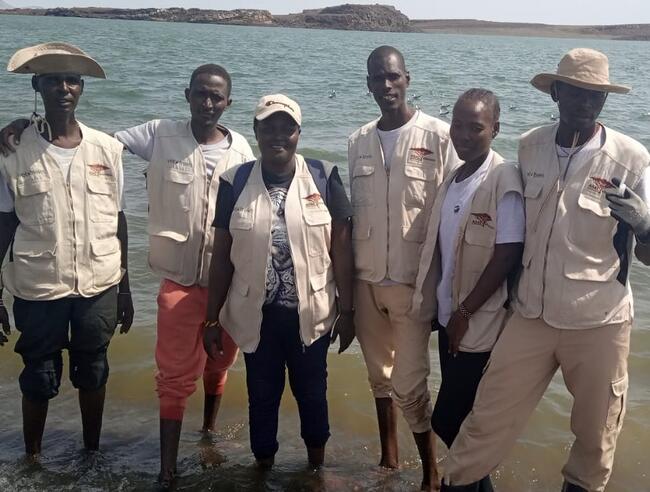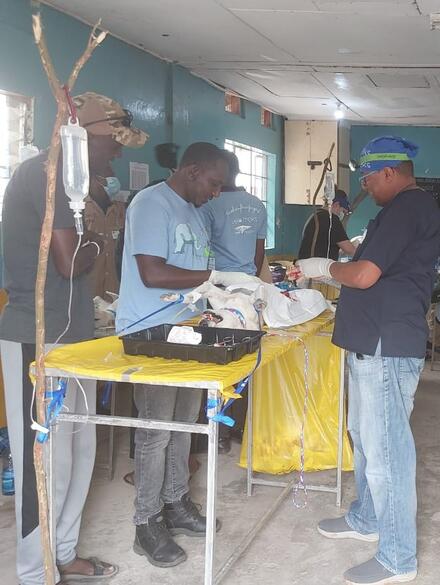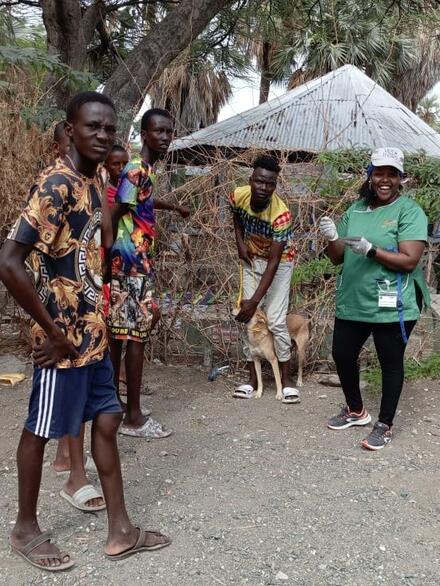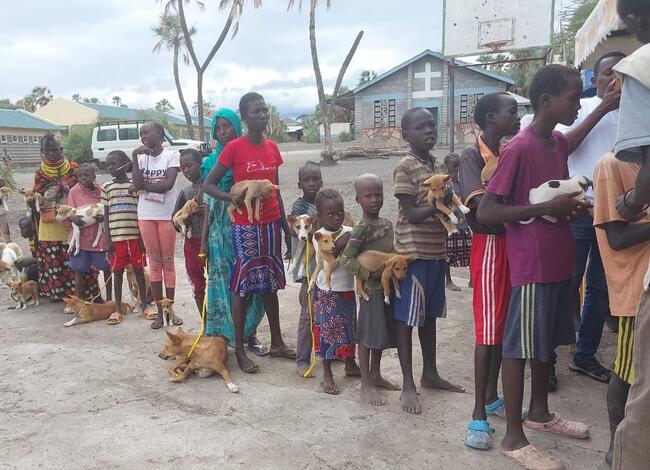August Excellence in Action: ASAL eXtension, Kenya
In August 2024, GARC recognized its first Rabies Centers of Excellence (RCE), and since then many more organizations have joined our community of dedicated rabies champions. RCEs approach rabies elimination in their community with a keen awareness of local challenges. As part of our Communities Against Rabies initiative, we want to showcase the incredible work that they do.
For this month’s Excellence in Action, we are proud to share the work of ASAL eXtension, Kenya. ASAL eXtension’s passionate team helps Kenya’s most underserved communities. They are an independent consultancy firm offering their expertise in research, policy and strategic solutions for the Agricultural sector. Their guiding principle is ‘Knowledge for Development’. This shows their commitment to ensuring communities become self-reliant through education and empowered to use technology to their community’s advantage. Dr. Pauline Gitonga, Founder and Lead Consultant, shares their work and some of the lessons that they have learned from being an RCE.
1. Tell us more about who you are and where you work.
We are based in Kenya and work across the country’s arid and semi-arid lands (ASALs), with pastoralist communities. These areas have some of the highest rabies risks, however, they also do not easily have access to veterinary services.
Since 2018, our work has grown from Turkana County to Marsabit, and now to Kajiado County. Using our innovative Public-Private-Community Partnership (PPC) Model, we put the One Health approach into practice at the community level by:
- Conducting free mass rabies vaccination campaigns for dogs and cats;
- Training Community Health Promoters (CHPs) and Community Disease Reporters (CDRs) to deliver education on bite prevention, basic dog bite first aid, and advocate for responsible dog ownership;
- Empowering trained CHPs and CDRs to raise rabies awareness in primary schools and within the broader community through interactive discussions and hands-on demonstrations of first aid for bite wounds; and
- Strengthening rabies surveillance by supporting the transport and laboratory confirmation of suspected rabies cases in animals, including piloting the use of rapid diagnostic kits.

2. What are your biggest challenges in working as an RCE?

As with many organizations working towards rabies elimination, we face several challenges. The first challenge that makes our day-to-day activities difficult is the remote terrain in the ASAL regions making follow-up vaccination rounds and surveillance logistically demanding. A second major challenge we face is the limited veterinary infrastructure in the communities we serve. Many areas lack access to reliable local veterinary services, making timely bite case management difficult. As a result, suspected rabies samples often cannot be promptly submitted for testing, and bite victims may face delays in receiving the critical care that they need. This gap also prevents us from maintaining consistent vaccination coverage. Limited funding also constrains us in being able to sustain and expand our efforts. Securing sufficient financial resources remains an ongoing challenge, particularly as we strive to expand free vaccination campaigns and community education efforts into new high-risk counties.
Initially, we invested in high-volume spay and neuter clinics as part of our approach to managing the dog population. However, we have since refocused our limited resources towards mass rabies vaccination and community awareness campaigns, because this has the most significant immediate impact for counties facing active rabies outbreaks.
One example of our efforts is our work in Kajiado. In just the last two months (May and June 2025) we have already vaccinated over 1,000 dogs and cats, in close partnership with the county veterinary team. These vaccines have been effectively distributed across 4 out of 5 sub-counties. We would not have been able to achieve these numbers if we had included spay and neuter clinics. While sterilization is valuable for long-term dog population control. Effective control of rabies outbreaks requires swift vaccination campaigns and widespread public awareness.
Lastly, changing long-standing myths and increasing awareness about rabies bite first aid and the importance of timely Post-Exposure Prophylaxis (PEP) remain ongoing challenges to saving lives.
3. Why did you want to be a GARC Rabies Centre of Excellence?

Being recognized as a GARC RCE has provided us with credibility and essential practical support. GARC’s resources, like printed flyers and age-appropriate school booklets, help us reach remote communities that would otherwise be left behind.
One of the most significant advantages to being an RCE is our access to the GARC Data Platform. The digital tracking tools on the GARC Data Platform strengthens our local surveillance, enabling us to monitor vaccination coverage and bite incidents in real time. It gives us strong evidence to share with county governments, partners, and communities, and also helps us to make informed decisions about where to focus our resources.
Another advantage of being part of the GARC network is that we are connected to other RCEs globally. It provides us with a platform to share our locally proven PPC Model and learn from others who are tackling similar challenges. This recognition keeps our community champions, county leaders, and partners motivated.
4. Do you have any campaigns that you want to highlight for 2025?
Yes! For the remainder of 2025, we have two primary focus areas. Our first focus is scaling up our work in Kajiado County. Recent surveillance has revealed high human bite incidence rates in wards such as Matapato South and Ildamat. We will:
- Run targeted mass vaccination drives in hotspot villages such as Mailitisa, Mile Tisa, Meto, Bissil, and KMQ;
- Train additional CHPs and CDRs to strengthen community awareness, bite first aid, and PEP referral;
- Expand our school-based rabies education, distributing more age-appropriate materials that teach children how to interact with dogs safely; and
- Continue dog censuses and KAP surveys to monitor the impact and adapt our approach.
Our second focus will be completing our direct support in Marsabit County in August. We have been working here for the past three years. Sustained annual mass vaccination, strong community awareness, and local surveillance have helped the 15 Loiyangalani target villages achieve zero dog bites in humans and zero rabies cases in dogs since November 2024! This success demonstrates that sustained annual vaccinations, even without intensive dog population management, can significantly reduce dog bites and interrupt local rabies transmission cycles. Importantly, the Marsabit County Government now has robust local evidence that it can use to scale up rabies prevention efforts to other hotspot zones in the county. More NGOs and local leaders are also stepping up to continue vaccination and awareness initiatives. This transition demonstrates that our PPC Model fosters local ownership and sustainability, ensuring communities remain protected long after our direct involvement ends.

5. How have you used the GARC resources in your community?
GARC’s support has been fundamental to our successful impact. GARC’s printed awareness resources especially the flyers, posters, and school booklets, have been crucial for teaching thousands of children and their families about rabies bite prevention, responsible dog ownership, and the importance of seeking immediate medical help.
Equally important is GARC’s digital surveillance and tracking tools. The GARC Data Platform helps us to collect, analyze, and report reliable data on vaccination coverage and bite cases. This has improved how we track our progress, measure results, and demonstrate impact to county governments, community networks, and other partners.
Read more about their incredible work here: www.asalextension.org
Follow them on social media:
https://www.instagram.com/vetatasalextension/
If you have any questions, contact them at: asalextension@gmail.com